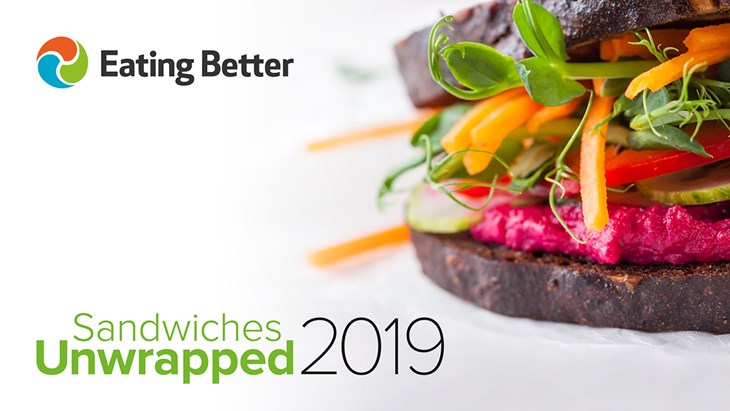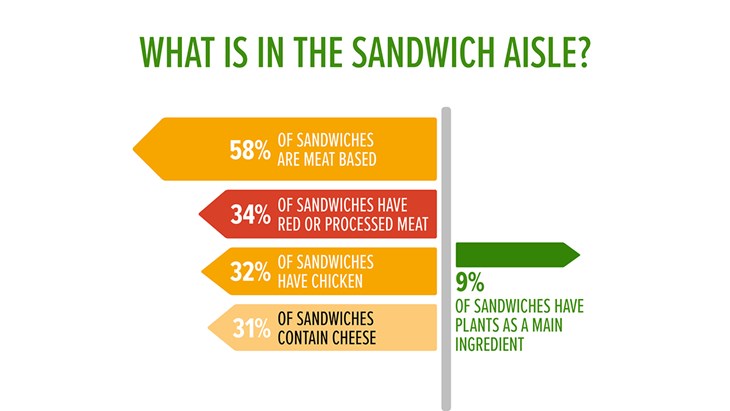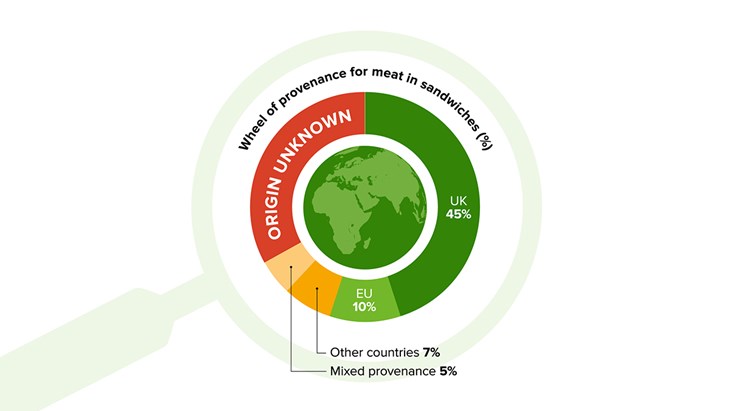Published 22/05/2019
It’s British Sandwich Week and the latest survey of sandwiches available on the high street carried out by the Eating Better Alliance shows that shifts by retailers in this category has the potential for a big health, environment and animal welfare impact.

Sandwiches are an iconic staple of the British diet: last year we bought an incredible 4bn ready-made sandwiches, at a cost of £8bn. 76% of consumers buy lunch to eat out of home for an everyday occasion.
What’s in our sandwiches?
The research included data on 620 sandwiches available from popular lunch time retailers. It found that while some retailers, particularly Pret and Tesco, have made progress in terms of diversifying their sandwich ranges to include more plant-based options, the volume of meat-based sandwiches is a big concern. 85% of sandwiches on the market still have meat, fish or cheese as their main ingredient.

Simon Billing, Executive Director of Eating Better says: “The good news is that some retailers are responding to consumer demand for more plant-based options. But given the urgency of our climate and biodiversity crisis they need to double down on their efforts to support options that are better for the environment.”
Anna Taylor OBE, Executive Director, Food Foundation says: “Sandwiches and ready meals make up a significant part of our diet. Only 14% of ready meals and 30% of sandwiches are meat and fish free. Replacing meat with veg is a critical part of our journey to eating better and living longer, but the supermarkets and manufacturers are not yet doing enough to help us make that journey.”
The research found that 33% of meat sandwiches contained meat of unknown origin. This includes all of the meat sandwiches at Boots and Subway, and the vast majority at EAT. Only two sandwiches carried any meat certification which consumers could find helpful when making their selection.

Simon Billing, says: “Retailers are letting their customers down on transparency of provenance of ingredient meat in sandwiches. We would like to see this made clear across all meat sandwiches. We are also calling on all retailers to commit to higher standards of animal welfare, for fresh meat consumers have choice to go for ‘better’ options but not for sandwiches.”
The importance of labelling
With the rise in vegan, vegetarian and flexitarian diets among consumers, and growing concern for the impact of food production on the environment, climate change and animal welfare, now is a prime opportunity for retailers to get on board by:
- Providing more meat-free lunch options by increasing the range of plant-based sandwiches
- Committing to better egg, meat, fish and dairy, by offering products that meet higher welfare standards of production, such as RSPCA Assured, free range.
- Making the provenance of all animal derived ingredients clear on packaging, by providing clear method of production and country of origin labelling
Shops that offer a clear choice of plant-based sandwiches, alongside appropriately labelled higher-welfare sandwiches, will find that consumers respond just as they have for clearly labelled eggs, which has seen a rapid rise in the purchase of ‘free-range’ eggs.
To view the full report click here